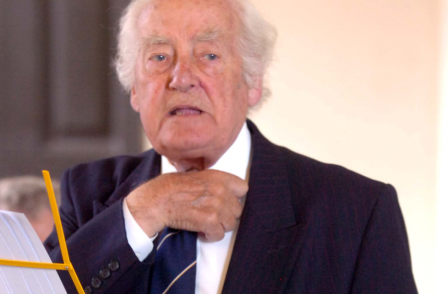
Veteran regional newspaper owner Sir Ray Tindle today issued a plea to the three party leaders to reconsider plans for a statute-backed system of press regulation which he fears few publishers will support.
The press regulation Royal Charter agreed between the three main political parties is set to go for approval by the Privy Council at the end of the month. This follows the rejection of a Royal Charter on press regulation put forward by publishers.
Speaking to Radio 4 he said: "I am convinced we must maintain the right to free speech and the right to a have a free press. Free speech is non-negotiable.
"We've had a free press for 300 years. Let us not lose it now."
Appealing to party leaders David Cameron, Nick Clegg, Ed Miliband and Culture Secretary Maria Miller – the 87-year-old owner of 200 local papers said: "Please don't proceed to the next stage with this proposed Royal Charter without talking once more with the press.
"If the proposed charter goes forward as it is, the majority of the press, maybe the entire press, may not co-operate."
Publishers are understood to be most concerned about a clause in Parliament's Royal Charter which is underpinned by separate legislation and means it can be amended in future with a two-thirds majority of both Houses of Parliament. This is seen as giving politicians the power to create a more oppressive regulation regime with relative ease at some point in the future.
Tindle said: "Surely it's better to try to agree something that will work rather than having us say, forever more, that 300 years of freedom of the press were lost in 2013 by a charter written by politicians, imposed by politicians, controlled by politicians and devised at a meeting which the press was not present."
The cross-party Royal Charter is based on a document which was finalised at meeting between the three main political parties and campaign group Hacked Off back in March.
Tindle pointed out that the phone-hacking which prompted the Leveson Inquiry and subsequent Royal Charter process was carried out by "0.1 per cent" of the press – and he said that laws already exist to deal with it.
He said: "My strong plea is, please, give more time to see if, by talking to the press again and giving further consideration, something might emerge which might ease the present situation which appears to this local newspaperman to be both unfortunate and explosive.
"No harm can come from such a meeting. A slight delay, if that were entailed, could not make matters worse and could do a lot of good for both the participants.
"Such a lot hangs on this problem. The next fortnight is critical."
Publishers have yet to formalise their response to the Royal Charter published last week. But opposition to it appears to be hardening.
Southern Daily Echo editor Ian Murray yesterday wrote a strongly critical piece about the Parliament-backed press regulation plan. And today The Sun published an opinion poll which suggested most members of the public have reservations about the proposed statute-backed system of press regulation.
Email pged@pressgazette.co.uk to point out mistakes, provide story tips or send in a letter for publication on our "Letters Page" blog
